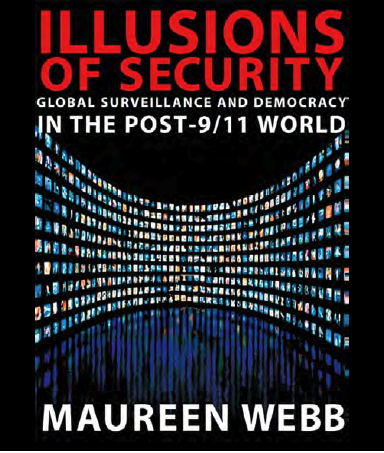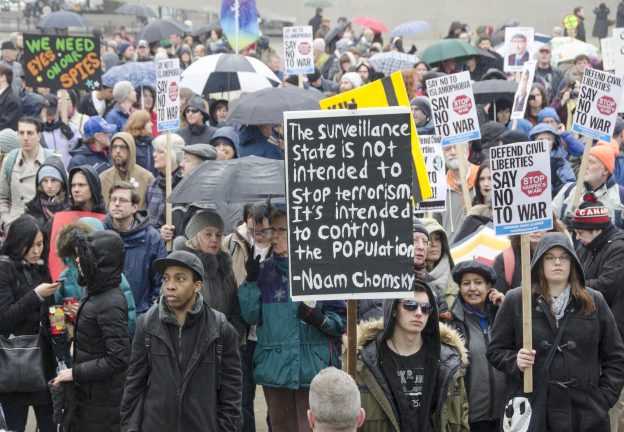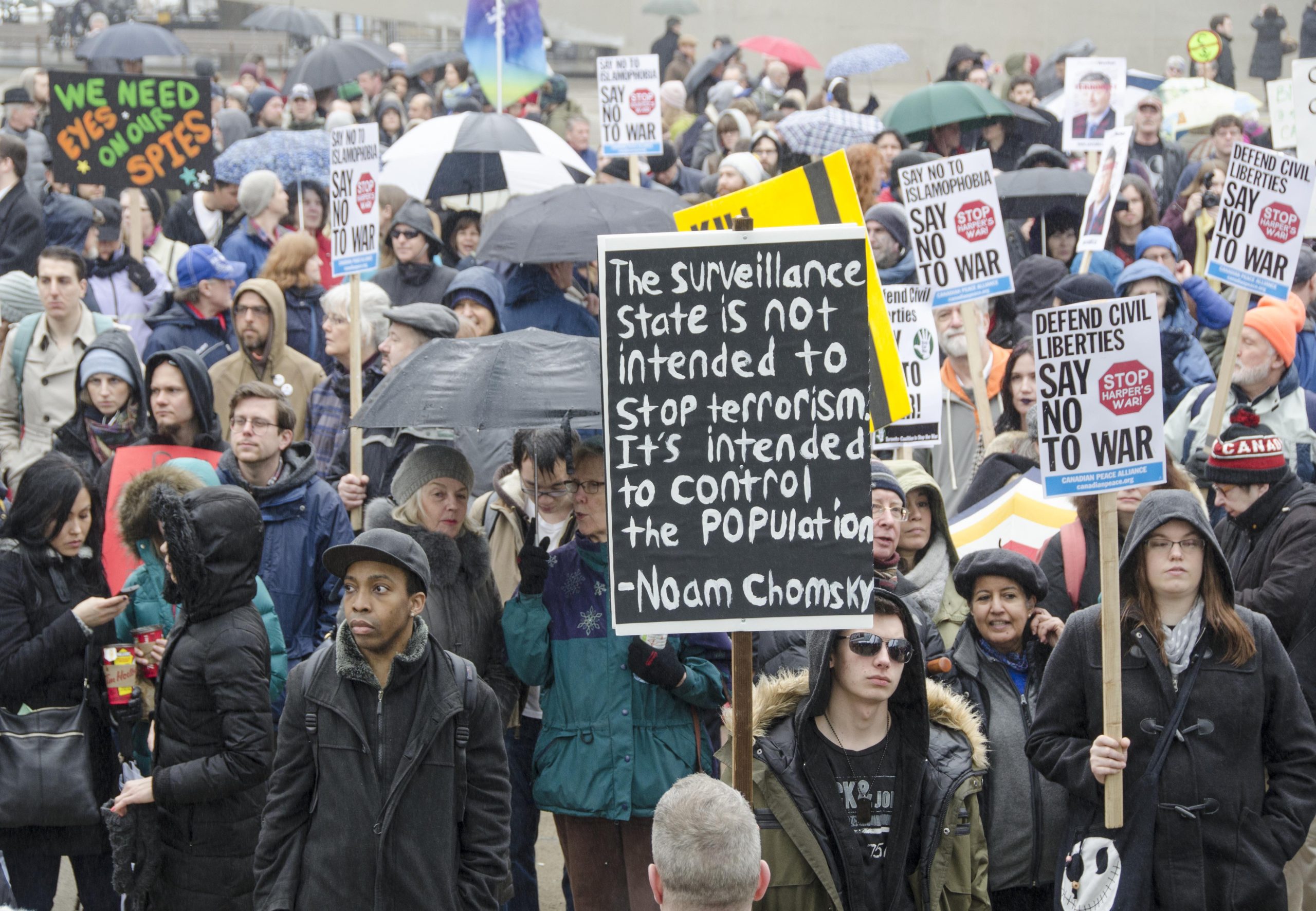
Credit: Vicente Méndez
By Maureen Webb
2005: ICAMS campaign
In 2005, the International Civil Liberties Monitoring Group (ICLMG) organized an Ottawa summit of NGOs from around the world to explore concerns about governments’ increasingly globalized ‘War on Terror’ measures.
Due largely to the relationships that then-ICLMG national coordinator Roch Tassé and Brian Murphy, an ICLMG steering committee member, had built over the years, we were able to get big players, including the EU’s Statewatch, Walden Bello and his group Focus on the Global South, the American Civil Liberties Union, the US Center for Constitutional Rights, and the Quebec Ligue des droits et libertés, to come to Ottawa for four days and to engage in in-depth discussions about what was going on in our respective jurisdictions.
We saw governments working in a coordinated, lockstep fashion, and through opaque, unaccountable supranational bodies to bring in similar measures without any democratic debate at the national level. And, we felt the dots in this pattern – this new dark turn in global governance – had to be connected, understood and countered on an international scale by an international coalition of local civil society groups.
I think that the work done that week was pivotal because, coming together from our respective countries, we were able to see the ‘War on Terror’ for what it was: an anti-democratic coordinated power grab, laying the ground for the erosion of national sovereignty and nationally guaranteed constitutional rights for decades to come.
You could say, the global surveillance/industrial complex developed their playbook and infrastructure during the years of the war on terror and successfully convinced populations to turn these on “the Other” (at that time, Muslims and, in many countries, political opponents). And, over the past three years, this same surveillance/industrial complex has been experimenting on turning a similar playbook and infrastructure on “the rest of us” – with well-along-the-way plans for making digital ID and central bank digital currency the foundation of a new economy – and has had chilling success in getting people to acquiesce to the kind of “nudge” and “social credit” systems that will turn our democracies into heavily gated and controlled surveillance societies. While many have been overlooking these developments, those of us who’ve been in the trenches fighting national security surveillance overreach for the past twenty years will readily recognize the emerging regime’s antecedents and its dangers.1
During the four days of the Summit, we conceived and agreed to collaborate on an international campaign against mass surveillance (ICAMS) for which Ben Hayes of Statewatch and I wrote the core analysis.
Co-sponsored by the organizations at the Summit, the campaign was launched simultaneously in San Francisco, Ottawa and London in April 2005. It was then presented at the World Social Forum in Porto Alegre. Nearly 300 civil society organizations signed on to the campaign’s Manifesto within the following year.
The people who were involved in the 2005 Summit became close colleagues, collaborators, and trusted advisors to ICLMG. Many of them were back in Ottawa a few years later for a colloquium of international experts organized by ICLMG and the University of Ottawa Faculty of Law to draft the Ottawa Principles – a codification of the main areas of international law relevant to government counter-terrorism measures. One of the lessons learned from the 2005 Summit initiative was that there is no substitute for in-person, working relationships. Bringing representatives from each of those groups to Ottawa was an investment that paid off for years to come.
2006: International Conference of Privacy Commissioners
In 2006, Roch Tassé and Patricia Poirier organized the Civil Society Forum that ran parallel to the International Conference of Privacy Commissioners in Montreal. The Forum’s recommendations picked up on the content of the ICAMS campaign Manifesto and, in 2009, the Manifesto was largely adopted at the civil society proceedings of the International Privacy Commissioners’ Conference in Madrid, and reformulated as the Madrid Declaration of Global Privacy Standards for a Global World.

Illusions of Security by Maureen Webb. Credit: City Lights Publishers
2007: Illusions of Security
Between 2005 and 2006, I wrote a book based on the analysis of the ICAMS campaign, Illusions of Security: Global Surveillance and Democracy in the Post‑9‑11 World, published in 2007 by San Francisco’s City Lights press, to further influence policy and raise public awareness on ‘War on Terror’ surveillance issues.
Media included interviews with Democracy Now!, CBC’s The National with Peter Mansbridge, BBC’s World Service, Chicago Public Radio, Air America, the Ottawa Citizen, Montreal Gazette, Mexican TV, Barcelona’s el Periodico, the Winnipeg Free Press, and even Playboy magazine. Venues I spoke in included the Chicago Council on Global Affairs, the World Affairs Council of California, Canadian Association for Security and Intelligence Studies International Conference (with CSIS, FBI, CIA, and MI5 attending), the International Investigative Journalists conference, film festivals, and numerous universities – to give you an idea of the reach.
Much of what was predicted about global surveillance in the 2005 ICAMS campaign and my 2007 book came true and was confirmed in the 2013 Snowden leaks. And, be aware: surveillance technology has made quantum leaps since the time of Snowden’s revelations, making these digital ID systems we’ve been seeing during the pandemic and in recent global governance plans, in my view, the civil liberties fight of the century.
Maureen Webb is a constitutional and human rights lawyer and the author of Coding Democracy (MIT Press, 2020) and Illusions of Security (City Lights, 2007). mitpress.mit.edu/author/maureen-webb-28478 & ubc.academia.edu/MaureenWebb
Since you’re here…… we have a small favour to ask. Here at ICLMG, we are working very hard to protect and promote human rights and civil liberties in the context of the so-called “war on terror” in Canada. We do not receive any financial support from any federal, provincial or municipal governments or political parties. You can become our patron on Patreon and get rewards in exchange for your support. You can give as little as $1/month (that’s only $12/year!) and you can unsubscribe at any time. Any donations will go a long way to support our work. |





